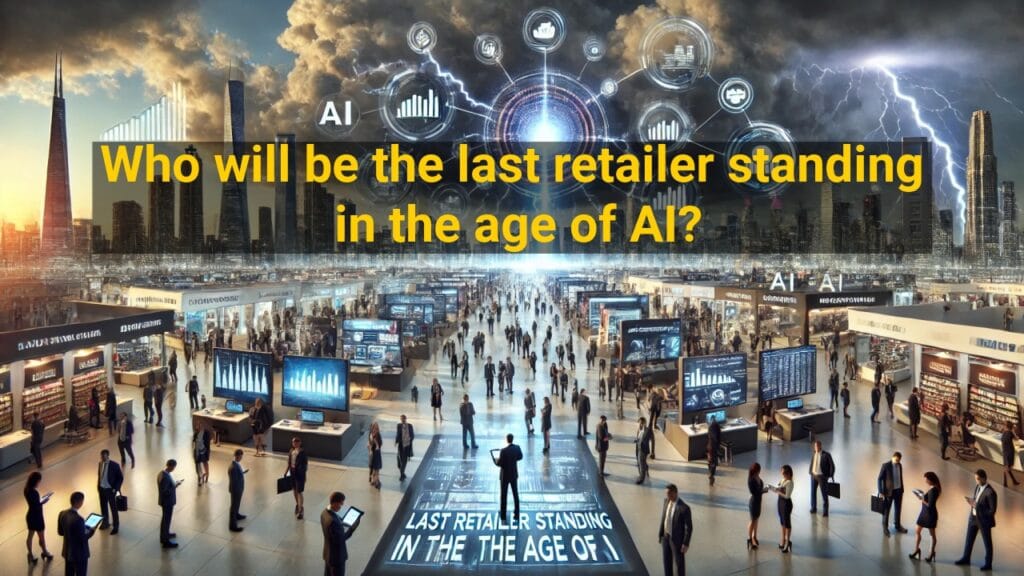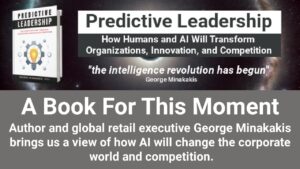

This weekend, retailers will gather in New York City for one of the largest trade shows in the world, run by the National Retail Federation. Every retailer intends to learn something new to give them a competitive edge. First, twelve years ago, when I wrote “The Last Retailer Standing,” the public relations firm hired to promote the book created a press release. The headline: who will be the last retailer standing? So, I have admittedly borrowed from my past to bring it into the future. Why? Because I believe we are at the same pivotal moment with AI as we were with e-commerce over twelve years ago. Who will be the last retailer standing in the age of AI?
Before we get there, I must point out that AI isn’t going away, and it will traverse our world for thousands of years. That may be hard to fathom, but this technology will only evolve and eventually integrate into all aspects of our lives. One of the most significant parts of a human journey is buying food, clothing, furniture, transportation, telecommunications, healthcare, travel, entertainment, safety, and insurance. The list is exhaustive. However, the longevity of these businesses is moderate. Within two decades, even the best of brands flounder for many reasons. When I attend these trade shows I find it fascinating how many are on stage and in a short period of time in the news for a shortfall in performance. It happens because of human bias getting in the way of the right decisions, but what are the right decisions?
I am not going to tell you with absolute conviction that this combination of actions or that will lead to success.
Data-Driven Decision-Making: Retailers must prioritize collecting, managing, and analyzing vast amounts of customer and operational data. AI thrives on quality data to generate insights, predict trends, and personalize customer experiences.
Personalization and Customer Experience: We have heard long enough about what makes a great customer experience. However, the truth be said, it is innate to whatever a brand does well and can attract and retain its customers as a result. Technology has been bringing us closer and closer to hyper-personalized service as we were breaking down the barriers of an old retail environment tied to just bricks and mortar.
Operational Efficiency: There is no question that if your house isn’t in order, you won’t get far in delivering service or products. Therefore, streamlining supply chain operations, inventory management, and workforce optimization are critical areas where business leaders and their teams must excel. AI can improve efficiency. Retailers must adopt AI to automate repetitive tasks and predict inventory needs accurately.
Adaptive Leadership and Innovation Culture: This is all about having the right forward-thinking leadership foundation; the ability to recognize important shifts and adapt to them is key. And this applies to technology far more today than it did twenty years ago when smartphones weren’t in the market yet.
Data Management and Analytics: These are the very starting points needed to ensure that a robust infrastructure is in place.
Comprehensive Data Collection: Gathering extensive data on customer behaviors, preferences, and purchasing patterns is crucial. This data serves as the backbone for AI algorithms to generate actionable insights.
Data Quality Assurance: Maintaining accurate, up-to-date, and clean data is vital. Inaccurate data can lead to flawed AI predictions and strategies.
Advanced Analytical Tools: Employing sophisticated analytics enables retailers to interpret complex data sets, facilitating informed decision-making and personalized customer experiences.
Customer-Centric Approach:
Personalization Strategies: AI can enhance customer experiences by providing personalized recommendations and services. Retailers should focus on understanding individual customer needs to tailor interactions effectively.
Omnichannel Integration: Ensuring a seamless customer experience across all channels—online and offline—is essential. AI can help unify these channels, providing consistent and personalized interactions.
Feedback Mechanisms: Implementing systems to collect and analyze customer feedback allows AI to adapt and improve services continually.
Operational Efficiency:
Inventory Management: AI can optimize stock levels by predicting demand and reducing overstock and stockouts. Retailers need to have systems in place to act on these AI-driven insights.
Supply Chain Optimization: Leveraging AI to streamline supply chain processes ensures timely restocking and efficient distribution, meeting customer demands promptly.
Workforce Management: AI can assist in scheduling and task management, ensuring optimal staff allocation based on predicted store traffic and sales patterns.
By focusing on these fundamentals, retailers can create a robust foundation for AI integration, leading to improved customer experiences, streamlined operations, and sustainable growth.
What I have learned about AI over the last eight years is that organizations that have spent the time, money, and human resources to build the right organization with the right vision, product, and brand story, provided that they are continuously innovating and designing new products and services they will be ahead of the curve.
Who will be the last retailer standing in the age of AI? Some of them are already there. My favorite brand is Walmart in terms of their commitment to continuous evolution, unlike some of their competitive predecessors who bought press releases that they were transforming into digital brands. The same thing will happen with AI. The real key to who will be the last retailer standing will be how well they industrialize human and artificial intelligence to identify, develop, and define the next-generation strategies and innovations. Everything else is just noise. I would like to add Amazon as an obvious AI leader, however to this list we need to add Costco and Canadian Tire.

CEO | MBA | Author | Advisor | Speaker | Business Visionary
George Minakakis is a Thought Leader and Keynote Speaker. His experience leading, developing, and reviving global brands make him a sought-after Executive Advisor.